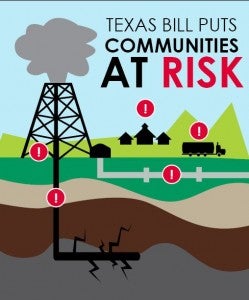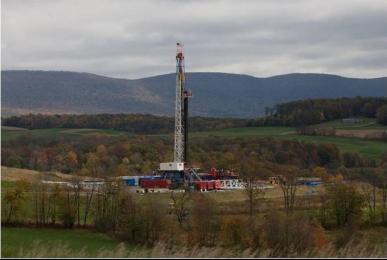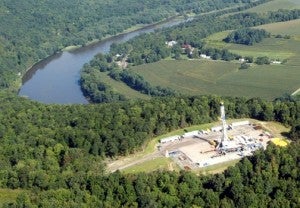
This commentary was originally posted on the EDF Texas Clean Air Matters Blog.
Today there are around 45,000 shale gas wells operating in the United States – triple the number in 2005 – and as a result, people are rightfully concerned about the extent of the shale boom’s potential damage to the environment.
The issue became the focal point of discussion this month in “Can Natural Gas Be Sustainable?,” a five-person panel presentation at the second annual SXSW Eco conference in Austin. As part of the panel, we discussed how stronger standards and employing best practices could minimize impacts of increased natural gas production in the wake of growing public concern about the health and environmental impacts of drilling.
Attendees of SXSW Eco represented a broad swath of perspectives, ranging from those who were against any natural gas development to those who wanted to see much more natural gas development. One attendee even criticized the title of the panel, presenting the position that developing any non-renewable resource is inherently not sustainable.
As for the sustainability question, one thing is clear: the natural gas industry has a lot of opportunity for improvement, and there is mounting public pressure to address environmental concerns. Nearly 61 percent of Americans have negative views about the oil and gas industry – higher than any other industry (David Blackmon, from FTI Consulting, actually joked that this was an improvement!)
As part of the discussion, I spoke about the many environmental and health impacts associated with natural gas development. Construction and drilling equipment can degrade local air quality with smog-forming pollutants and air toxics (Example: activities at the Barnett Shale in Texas). I also spoke about the implications of faulty well construction as one of the major causes of natural gas leakage, and emphasized that while natural gas is touted as a low-carbon fuel source, leaks from the production, distribution, and use of natural gas could undermine the greenhouse gas advantage combusted natural gas has over coal.
EDF is working hard to address the key problem areas associated with natural gas development: exposure to toxic chemicals and waste products; faulty well construction and design; climate impacts from methane leakage; local and regional air pollution; and land use and community impacts. Our team is engaging with community, government and industry stakeholders to help identify ways to minimize both human health and environmental risk, including:
- Comprehensive disclosure of hydraulic fracturing chemicals
- Modernization of rules for well construction and operation
- Systems-based management of wastes and water
- State and national standards for improving air quality and reducing climate impacts
- Minimization of land use and community impacts from natural gas development
Fellow SXSW Panelists
Other speakers presented varying perspectives on natural gas issues. Chris Helman, Associate Editor of Forbes magazine, moderated the panel and emphasized the public interest on the topic, as well as the contribution of natural gas to the country’s energy portfolio.
George Peridas, a scientist from NRDC, prefaced his comments by saying, “We have a lot of work to do before we can call natural gas clean.” Peridas gave examples of numerous exemptions given the natural gas industry under the Safe Drinking Water Act, the Clean Water Act and the Clean Air Act. As well, those tasked with enforcing the state natural gas regulations that currently exist lack the ability to go out, fully inspect and enforce those standards. The result, he said, was that “industry is a self-policing entity right now.”
Much of his policy work focuses on climate change and correspondingly, Peridas said that natural gas could help with climate change and air quality when compared to coal. “The key is that gas needs to displace dirtier fuels,” he said. “A bridge is not the right frame of mind, and we cannot afford to treat gas as an abundant resource. We need to address its impacts now.”
Some of the solutions Peridas proposed included: designation of “off-limits” areas that provide fresh water resources or wildlife/conservation value; stopping those leaks that waste methane and contribute to greenhouse gas emissions; development of a comprehensive guide for how to drill safely (e.g., proper cement jobs at well sites); repealing the outrageous exemptions at the federal level that industry currently enjoys; focusing on measures and policies that promote solutions (e.g., solar energy); and ensuring that communities have a say in whether drilling proceeds in their areas.
Sister Elizabeth Riebschlaeger, a nun with Congregation Of The Sisters Of Charity Of The Incarnate Word, and community advocate for the Eagle Ford Shale, agreed strongly with co-panelist George Peridas and his push for more local regulations. She told the story of citizens in small, rural Texas towns being strongly impacted by the Eagle Ford shale, and even used the phrase “merciless exploitation” to describe her own such experience.
Sister Elizabeth asked the rhetorical question: “Are we counting our natural gas clean energy chickens before they hatch?” She then emphasized that society must consider all of the activities required to produce natural gas, including activities she has observed in the Eagle Ford Shale: trucks and heavy equipment; travel trailers for workers; transporting of sand and chemicals, fracking equipment, and toxic waste (produced during operations); construction of huge batteries and tanks; rigs operating 24 hours a day; loud compressor stations; damage to land requiring clean up; and more.
David Blackmon, managing director at FTI Consulting, represented industry’s point of view, which touts the “reality that over half of our electricity generating capacity is natural gas.” The demand for natural gas includes backing up intermittent supply from solar and wind power. He said that natural gas was one of the only power sources that could be “cycled up” in a matter of minutes and that coal made this process more expensive.
Blackmon said that the key to making natural gas sustainable was ensuring public trust; trust that it is being appropriately regulated at federal, state and local levels. “I absolutely agree that there are not enough inspectors in the Texas Railroad Commission to regulate it,” he said. “The good news is that most companies in the industry recognize the need for public trust and are working towards that.”
 The Texas Senate is poised to vote on House Bill 40, new legislation that threatens to gut municipal rules and oversight of oil and gas drilling. The bill, an over-the-top reaction to the Denton fracking ban, stacks the deck in favor of industry and if passed, will undo almost 100 years of local home-rule authority.
The Texas Senate is poised to vote on House Bill 40, new legislation that threatens to gut municipal rules and oversight of oil and gas drilling. The bill, an over-the-top reaction to the Denton fracking ban, stacks the deck in favor of industry and if passed, will undo almost 100 years of local home-rule authority.












